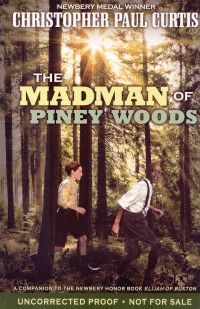| ________________
CM . . . . Volume XXI Number 3 . . . . September 19, 2014
excerpt:
This wonderful historical fiction novel for middle school students re-creates turn of the century life in Ontario. A sequel to Curtis' award-winning Elijah of Buxton, The Madman of Piney Woods lets readers in on how life continues for the descendants of Elijah and his Buxton, ON, community while introducing the trials and tribulations of Irish immigrants who survived the coffin ships to settle around Chatham. In Chatham, Alvin (aka Red) Stockard suffers the abuse of his grandmother O'Toole whose bitterness and anger suffuse her life and those around her. Red's kind and gentle father, a local judge, helps him to understand his grandmother's pain and to aim for high academic standards so that he can be accepted into the best science-based academy in Ontario. Red and his fishing friends are all terrified of a local mystery, the South Woods Lion Man, an eight foot monster with snakes for hair who would probably eat boys alive if they were silly enough to get caught. In nearby Buxton, Benjii Alston, who longs to be a professional newspaper reporter, writes amusing headlines that encapsulate his daily activities. Benjii suffers the humiliation of his younger brother and sister's carpentry success and teasing. He and his friends play war games, get back at his siblings, Patience and Stubby, and are entertained by the fireside stories of Mr. Swan where Benjii and his pals actually meet the notorious Madman of Piney Woods, Cooter Bixby, a scruffy secretive woodsman who claims to know Benjii's mother. There, the Madman tells the boys about the real monsters, the monsters of war, while he recounts his Civil War experience. After meeting each other at the Upper Canada Forensics Competition at which they each back their own favourites, Benjii and Red become fast friends. When Red's friend Curly confides that his father has shot someone, Red and Benjii track the injured man into the bush where they discover Bixby shot and dying. While Red stays bravely in the dark woods with the injured man, Benjii gets help from the mayor, Elijah, who tells Benjii the history of the Madman and how, over the years, the adults in the community have tried to support him through the pain of his war memories. The two communities lay Bixby to rest in the centre of a clearing in the woods while Benjii's obituary for Bixby becomes his first published writing. Both Red and Benjii are strong 13-year-old boy characters whose freedom to come and go in and out of the woods will amaze today's readers. Both boys are determined to be successful and have already staked out their career goals, yet they retain that wild, credulous, challenging behaviour of young boys who value their friendships above all. Red comes to terms with his grandmother's outrageous behaviour as he thinks on her horrendous childhood and the discrimination she suffered upon her arrival in Canada. Benjii comes to understand his parents' strict, high expectations as he learns more about Bixby and the community's history. In both boys' lives, racism has played a huge role, but they are, themselves, blessedly free of discrimination and hate. Secondary characters like Bixby, Red's father, Grandmother O'Toole and the boys' friends add depth to the story and ratchet up the tension. The fear the boys have of the Madman/South Woods Lion Man is easily understood as boys everywhere and at every time outdo each other with terrifying tales. The use of horses and trains as transportation, the respect the boys have for their teachers and education, the importance of the public speaking competition, and the apprenticeship of young teens set the scene firmly in pre-World War I rural Canada. Bixby's sad tales of the American Civil War help ground the stories of the early black settlers in Canada. Dialogue is natural and amusing in many ways while the use of dialect enhances the characters' stories, especially those of Grandmother O'Toole and Bixby. Curtis' theme of the importance of racial harmony permeates the book. The boys, a collection of black, native and white children, get along as all groups of boys do, their skin colour secondary to their personalities. The discrimination against the Irish and the suffering of the Blacks in the United States is horrifying. Curtis exposes the pain of many families with Curly's father's alcoholism, Grandmother O'Toole's abuse, and the early death of Red's mother. His secondary theme of the joy of playing in the woods will provoke envious sighs from today's urban readers who will soak up this engrossing tale. Highly Recommended. Joan Marshall is a Winnipeg, MB, bookseller who remembers what it was like to play outside unsupervised. Copyright © the Manitoba Library Association. Reproduction for personal use is permitted only if this copyright notice is maintained. Any other reproduction is prohibited without permission.
Next Review |
Table of Contents for This Issue
- September 19, 2014. |
